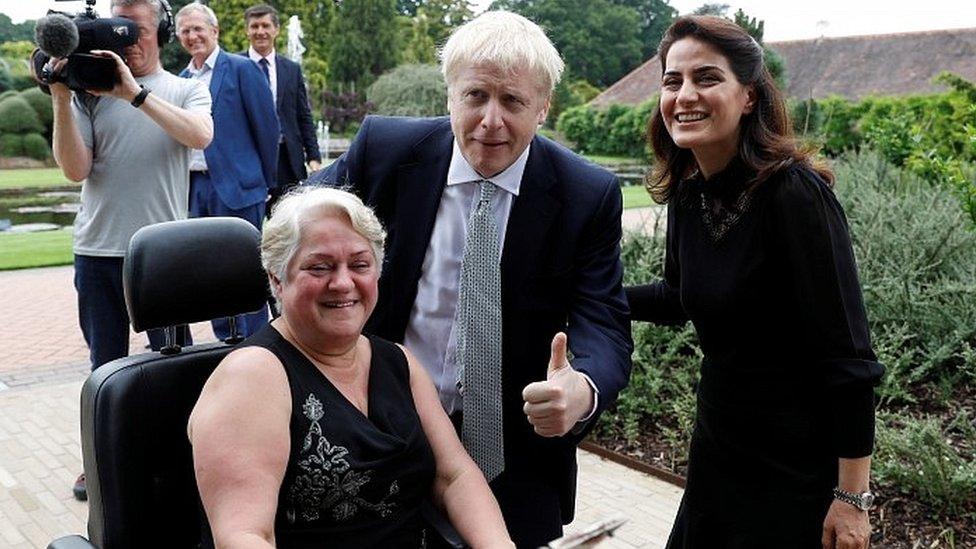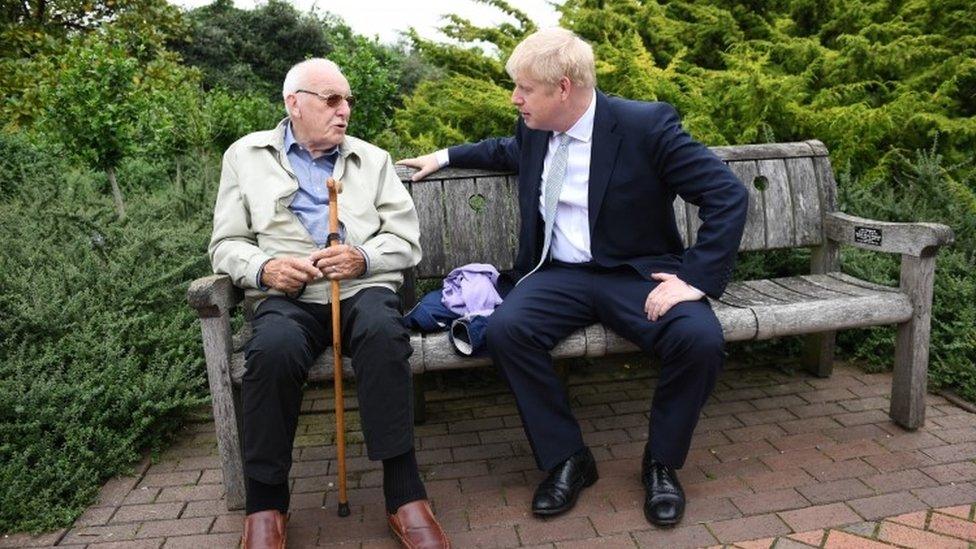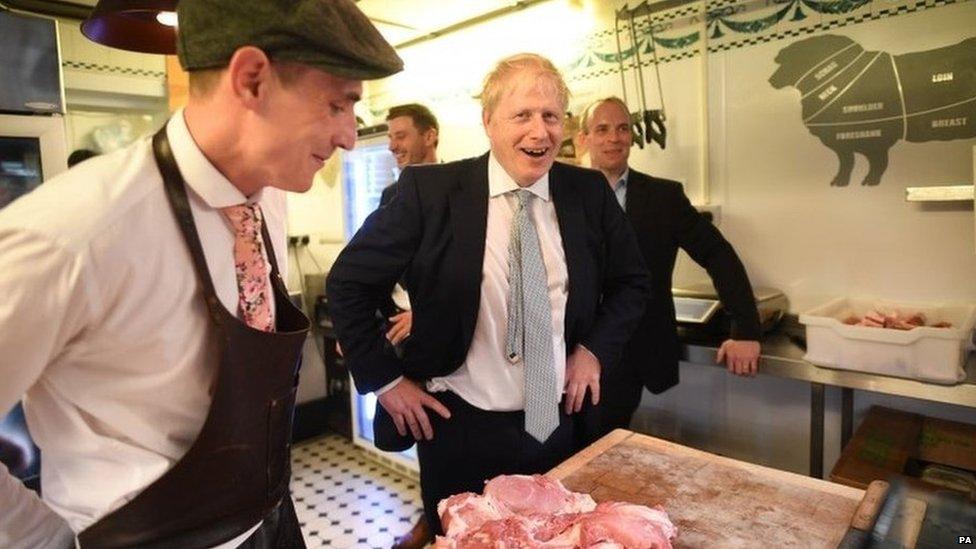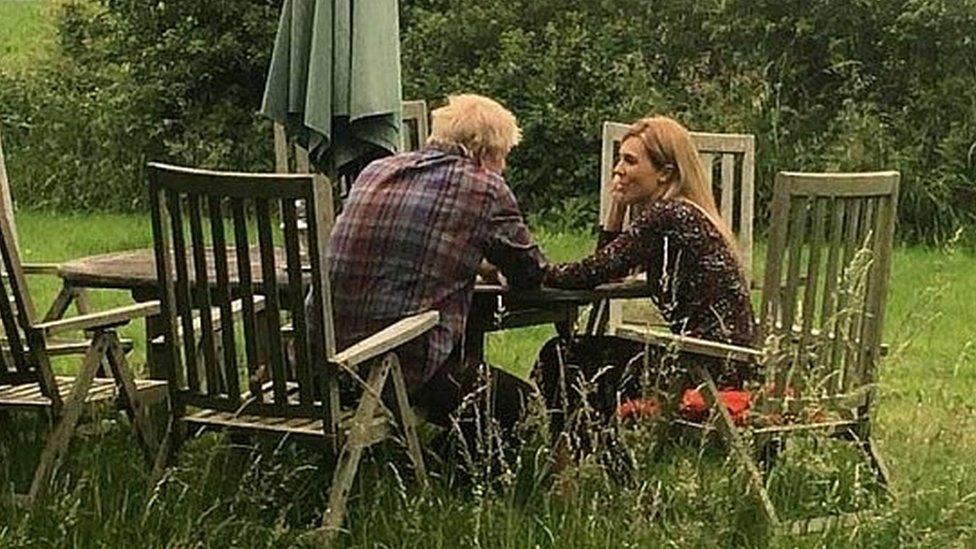Boris Johnson in 'deal or no deal' Brexit challenge to rival Hunt
- Published

Mr Johnson has said the public expects Brexit promises to be honoured
Boris Johnson has called on his Conservative leadership rival Jeremy Hunt to commit to leaving the EU on 31 October "deal or no deal".
Mr Johnson said the two men should agree that the revised Brexit deadline must be met "no matter what" in order to keep promises to the British people.
Mr Hunt has suggested he could seek extra time if he was close to getting a better deal but was not quite there.
The two are vying to succeed Theresa May, with the result due on 23 July.
The deadline for Brexit was pushed back to 31 October after MPs rejected the deal Mrs May agreed with the EU three times.
In an interview with Talk Radio, one of a series of media and public appearances, Mr Johnson said he would stick to that date "come what may, do or die".
In an effort to turn the pressure up on his rival, Mr Johnson later tweeted a copy of a letter he had written to Mr Hunt insisting this was the "central question" of the contest.
"Leaving on 31st October - with no ifs, buts or maybes - is the only way to restore trust in our democracy. In short this is about whether the original people's vote will be respected."
Allow X content?
This article contains content provided by X. We ask for your permission before anything is loaded, as they may be using cookies and other technologies. You may want to read X’s cookie policy, external and privacy policy, external before accepting. To view this content choose ‘accept and continue’.

Like Mr Johnson, Mr Hunt has also promised to renegotiate Theresa May's Withdrawal Agreement, particularly focusing on the controversial Irish backstop.
He has said he would back a no-deal exit as a last resort but he has hinted he might ask for more time beyond 31 October if necessary to get an improved deal.
Committing to a deadline that might come too soon to allow a proper negotiation risks triggering a general election and the "political suicide" of the Conservatives, Mr Hunt has said.
Responding to his rival's letter, Mr Hunt suggested Mr Johnson was afraid of debating the issue face to face.
Sky News was forced to scrap a planned debate later on Tuesday after Mr Johnson refused to attend, leading Mr Hunt's team to accuse his rival of "bottling it".
Allow X content?
This article contains content provided by X. We ask for your permission before anything is loaded, as they may be using cookies and other technologies. You may want to read X’s cookie policy, external and privacy policy, external before accepting. To view this content choose ‘accept and continue’.

Mr Johnson has struggled to explain in detail how he will get the EU and MPs on side in time to enable the UK to leave with a deal on Halloween.
But on a visit to the Wisley Gardens in Surrey, he insisted there was a "new dynamic" in place in Brussels and London since last month's European elections - which saw a surge in support for populist anti-EU parties - and there was "goodwill" on both sides to do a deal.

Mr Johnson belatedly hit the campaign trail on Tuesday

He stopped off at a butchers in Oxshott
He insisted getting rid of the backstop - the insurance policy designed to maintain an open border on the island of Ireland - was a precondition to a renegotiated agreement even though the EU has ruled this out on many occasions.
He suggested he would be willing to "suspend" the £39bn "divorce bill" the UK has agreed to pay the EU until he had secured commitments on trade and the border.
Pressed over why the EU would agree to this, the former Mayor of London said "what I bring is the ability to change the equation".
However, he conceded his plan to maintain frictionless trade with the continent after Brexit through Article 24 of the General Agreement on Tariffs and Trade (GATT) would require the approval of the rest of the EU and could not happen unilaterally.
This was reiterated by International Trade Secretary Liam Fox - a backer of Mr Hunt - who wrote in a letter to one of his constituents that Article 24 "would not, by itself, allow the UK to maintain tariff-free trade with the EU in the absence of a negotiated agreement".
"It is important that public debate on this topic is conducted on the basis of fact rather than supposition, so that we are able to make decisions in the best interests of our country," he wrote.
After days of criticism that he was hiding away, Mr Johnson undertook a succession of media and public appearances and met members of the public in a walkabout in Surrey.
But he continued declined to answer questions about Friday's row with his girlfriend Carrie Symonds.
There has been speculation about whether a picture of the couple sitting happily in a beer garden, which appeared in Monday's newspapers, was actually taken over the weekend as much of the initial coverage implied.

Mr Johnson said he was not responsible for what pictures newspapers published
Asked during an interview with LBC whether the picture was actually much older, Mr Johnson repeatedly refused to comment on its "antiquity or provenance" and said the persistent line of questioning was "farcical".
Mr Johnson has also raised eyebrows by making a series of uncosted spending pledges.
Areas ranging from social care and schools to infrastructure and broadband are all set for investment if he becomes prime minister, Mr Johnson has said.
He also said he would prioritise reducing the tax burden on those on lower incomes, by raising National Insurance thresholds, ahead of other measures.
He has faced criticism for proposing to also increase the level at which people pay the higher rate of income tax from £50,000 to £80,000, a move which financial experts have said would cost billions and favour the top 8% of earners.